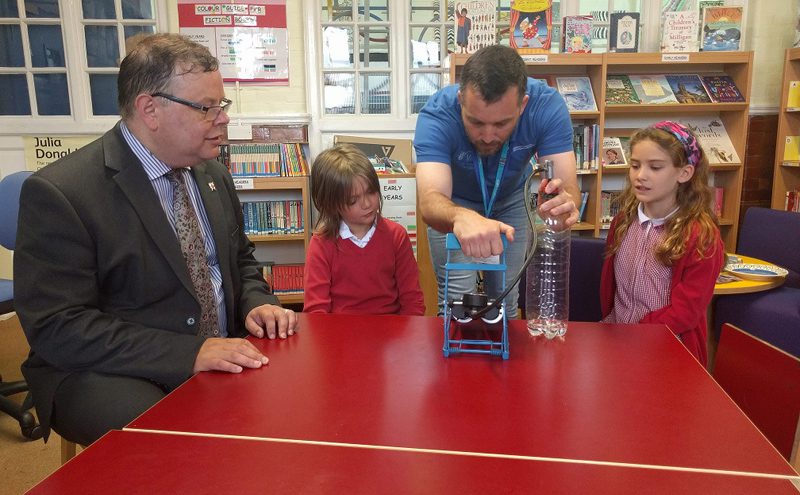The City of York Council is marking national Clean Air Day, on Thursday 21 June, with a number of air quality workshops, as well as travel initiatives such as urging drivers to switch off when they’re stationary.
Working with partners including University of York, York Hospital, Amey UK and community groups, the Council says it is continuing its drive to reduce pollutants in the air which can affect people’s health.
Over a dozen air quality workshops and assemblies are being held at schools by scientists from the National Centre for Atmospheric Science based at the University of York. These include Fishergate Primary School situated in one of York’s air quality management areas.

Cllr Waller, Rick Peltier from UoY and Yr 5 pupils from Fishergate do air experiments.jpg
The council has arranged for the city’s Walk to School Week to start on 18 June to encourage pupils to move more on their way to school. 22 schools and some 6,565 children will be involved and asked to cut car use by walking, scooting or cycling to school to reduce congestion around school gates and so improve air quality. If people have to drive the school run they are being asked to park and stride to give the children more exercise, fresh air and a better start to the school day.
Outside York railway station, at Union Terrace and St George’s Field coach parks, local taxi ranks and school gates around the city, council officers and colleagues from Amey UK will be encouraging bus, taxi, lorry and car drivers to switch off their engine while stationary. York Hospital will also work with its staff to reduce emissions from its vehicle fleet.
Community groups including Clean Air York have been sharing the clean air message including at the Bishy Road Street Party (17 June), when the highly successful high street closed to traffic for the day.
Air pollution has been linked to asthma, lung cancer, heart attacks and strokes. So efforts to further curb air pollution include urging people to leave their car at home and take to the streets.
Amazingly, car drivers can be exposed to twice as much air pollution as pedestrians and nine times more than a cyclist. As well as cutting down the amount of pollution, people who travel actively reduce their exposure to air pollution – and get some exercise too.
Cllr Andrew Waller, executive member for the environment at City of York Council, said: “Our sustained work on combating air pollution has resulted in a trend of air quality improving over recent years. However we recognise that we can do more. This is why soon we are backing Clean Air Day ahead of a new consultation on clean air zones in the city.
“We deliberately place real time monitoring in the hot spots, and so this ensures that we are able to make the case to Government for support to overcome air quality issues. Measures in our Air Quality Action Plan have led to one of York’s three Air Quality Management Areas (AQMAs) being revoked in December 2017 (Salisbury Terrace).”
Dr Ruth Purvis from the National Centre for Atmospheric Science based at the University of York, said: “Breathing is not optional, its essential, so it’s important that we try and make sure our air quality is the best it can be. Air pollutants are all around us but much of it comes from our activities such as driving and burning wood.
“Through practical workshops and assemblies, we are teaching children the importance of air quality so they and their families can then make choices to reduce their pollution.
“It is essential for children to see that science is all around them and not just in a sterile laboratory and that it is fun and interesting!”
York’s Low Emission Strategy and Air Quality Action Plan continue to deliver air quality improvements across the city. Measures delivered include:
• Converting 15% of York’s taxis from diesel to ultra low emission electric hybrids through York’s unique taxi incentive scheme
• A new taxi licensing policy specifying minimum emission standards for new or replacement taxis
• encouraging residents to walk, cycle and use public transport to beat congestion and pollution through the Local Transport Plan and i-Travel York Programme
• introducing 11 electric buses on the York Park&Ride network and additional electric buses to be delivered through the new Park&Ride contract
• retrofitting the world’s first electric double-decker sightseeing bus, with a further five diesel buses converted.
York has also been awarded £816,000 from the Office of Low Emission Vehicles (OLEV) after becoming the only Yorkshire location out of eight in the country to achieve ‘Go Ultra Low’ city status. The money will be used to fund a city-wide network of charging hubs







